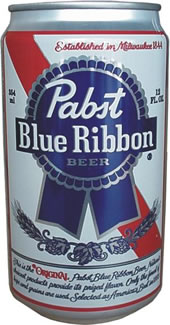 It is important that I respond to recent provocative claims made by Howard Junker before the rumors get out of hand. Junker declares me “a PBR addict.” While it is true that Junker and I enjoyed one enchanting moment in the evening drinking Pabst Blue Ribbon together, I wish to point out that it is largely economic circumstances that determine whether I imbibe a particular beer. When the difference rests between a $3 can of PBR and a $7 Guinness, as it did last week at Happy Endings, well then PBR is certainly the drink of choice. Further, last week, I imbibed two cans of PBR to offer my drinking solidarity with one Ami Greko, who I suspect was thinking along similar lines. I am not one to blow a billfold on alcohol.
It is important that I respond to recent provocative claims made by Howard Junker before the rumors get out of hand. Junker declares me “a PBR addict.” While it is true that Junker and I enjoyed one enchanting moment in the evening drinking Pabst Blue Ribbon together, I wish to point out that it is largely economic circumstances that determine whether I imbibe a particular beer. When the difference rests between a $3 can of PBR and a $7 Guinness, as it did last week at Happy Endings, well then PBR is certainly the drink of choice. Further, last week, I imbibed two cans of PBR to offer my drinking solidarity with one Ami Greko, who I suspect was thinking along similar lines. I am not one to blow a billfold on alcohol.
Do I have anything against PBR? Not really, although I would prefer other beers. Indeed, I welcome PBR over such lesser beers as MGD, Budweiser, and Coor’s. But PBR and Foster’s (and even Tecate) is as low as I will go. There are, after all, certain standards. Of course, if a lesser beer is the only affordable offering on the menu, then I’m not likely to be particularly stingy. Beer is certainly one of Western society’s great beverages, and I do enjoy it. I do not doubt that I am a beer enthusiast, generally titling my palate towards Pilsner Urquell and Guinness, and Heineken, when it is hot and humid. But the word “addict” comes loaded with a certain febrile advocacy, if not the outright suggestion that I should check into rehab. I am sure that Mr. Junker was having his particular revenge with this characterization, and he has succeeded in making me quite curious about the Park Slope literary bar, Pacific Standard. So perhaps the last laugh is upon me.
Of course, if any of the beer brewers mentioned on this post (or, indeed, any others) wish to impute that their particular beer is better than the competitors, then by all means send your crates to 315 Flatbush Avenue, #231, Brooklyn, NY 11217 for consideration, and I would be happy to offer lengthy thoughts on how the ales in question affect my palate. I make no promises of endorsement, but I will give your brew a fair shot. If Pabst Blue Ribbon wishes to redeem itself from the “low” rating it has received here, it is likewise open to send crates my way purely in the interest of critical reassessment.
 After breakfast, I found myself offering an impromptu historical tour of Brooklyn, learning in media res that Grand Army Plaza at one point had a
After breakfast, I found myself offering an impromptu historical tour of Brooklyn, learning in media res that Grand Army Plaza at one point had a